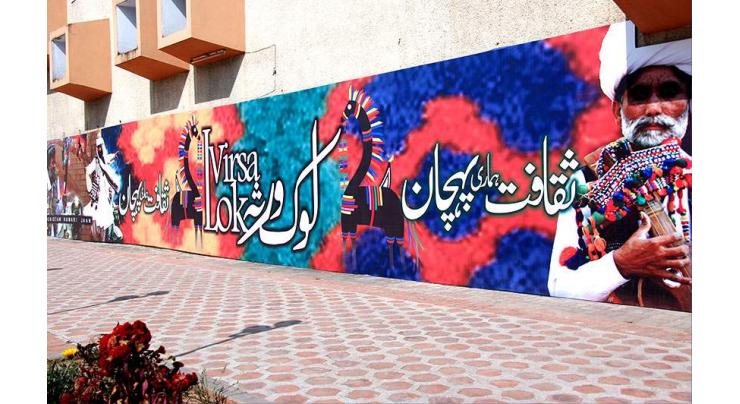
- Home
- Showbiz
- Lollywood
- Live performance by Ustad Roshan Abbass Khan, his brother Ustad Ghulam Abbas Khan on Oct 25 at Lok V ..
Live Performance By Ustad Roshan Abbass Khan, His Brother Ustad Ghulam Abbas Khan On Oct 25 At Lok Virsa
Anees Ahmed (@Aneesah05582539) Published October 23, 2018 | 08:06 PM

National Institute of Folk and Traditional Heritage (Lok Virsa) would organize "Muzakra" a literary session on Music Discourses followed by a live performance by Ustad Roshan Abbass Khan and his brother Ustad Ghulam Abbas Khan on October 25.
ISLAMABAD, (UrduPoint / Pakistan Point News - 23rd Oct, 2018 ) :National Institute of Folk and Traditional Heritage (Lok Virsa) would organize "Muzakra" a literary session on Music Discourses followed by a live performance by Ustad Roshan Abbass Khan and his brother Ustad Ghulam Abbas Khan on October 25.
Ustad Roshan Abbass Khan, a legendary singer of classical and contemporary music of Gawalior Ghrana would deliver a lecture on "Music Discourses".
He has been groomed under the tutelage of his late uncle Ustad Ahmed Ali Khan and father Ustad Rahmat Ali Khan of Gwalior Gharana. Roshan can be termed as an exciting prospect for Pakistani classical music.
Though he is not a scholar but through his experience as a teacher of classical music in London, he has developed his own perspective on musicology which he wants to share with public.
He would share his thoughts on the origin and evolution of music, variation in 12 notes and principle of variation, explanation of tempo and notes, Music and religion, importance of music in human life and recommendations for safeguarding of folk and classical music of Pakistan.
Gwalior Gharana is considered to be one of the pioneering schools of khayal singing alongside Kirana, Qawwal Bacchay, Talwandi and Agra. The Gharana is said to have been founded by Ustad Nathan Peer Bukhsh who was associated with the Gwalior court. His art was passed on to his grandsons, the legendary Ustads Haddu and Hassu Khan.
Roshan hails from a family of musicians who have been vocalists for almost 500 years.
However the first recognized name of his family is that of Baba Bannay Khan who became a student of Khan Sahabs Haddu-Hassu Khan of Gwalior.
Other renowned members of the family are Khan Sahab Meeran Bukhsh Khan, Ustad Pyare Khan, Ustad Jamal Khan, Khan Sahab Sainday Khan, Khan Sahab Misri Khan, Khan Sahab Ghulam Rasool Khan, Ustad Umeed Ali Khan, Mohammad Din Khan and Ustad Ahmed Ali and Ustad Rehmat Ali Khan.
The first essential feature of Gwalior is "Aakar ka Gana". They don't rely on a vocal technique known as "raggee". Aaakaar ka gana is highly valued and uses singing in a full throated manner.
The second feature of Gwalior is the possession of authentic asthayi antaras, they have many bandishes which can be traced back to Ustad Nayamat Khan Sadarang. The bandish or composition is central to the performance in khayal, and the raag is presented through the bandish.
Thirdly layakari or rhythmic interplay features strongly in their gharana, there are many compositions which are composed in difficult time cycles such as Dhamar, Ikwaai and Talwara. They also use the 4th laya concept which involves taans at four times the speed of the tempo. Fourth feature is that they have many taans like teen saptak ki taan and spaat taan.
Recent Stories

5 Customs officials martyred as their vehicle ambushed by terrorists in D I Khan

Pak-New Zealand match called off due to rain

NHA restores traffic on roads affected by recent rains in Balochistan

China to fully support Pakistan's efforts against terrorism: Ambassador Jiang

U.S. envoy calls on Foreign Minister Ishaq Dar

Poland arrests man over suspected plan to kill Zelensky

EU wants to ease youth movement to and from UK

Police foils attempt of supply mainpuri raw material

Helicopter crash kills Kenya defence chief, nine other senior officers: Ruto

Govt making efforts to eradicate polio: DC

Parliamentarians hail President's speech as reminiscent of state policy, rebuke ..

Collective efforts to overcome challenges to education, say speakers at Int'l co ..
More Stories From Showbiz
-

Death anniversary of famous singer,actress Khursheed Bano observed
6 hours ago -

Bushra Ansari ties knot with Iqbal Hussain
2 days ago -

Rahat Fateh Ali Khan embarks on Umrah journey
13 days ago -

Famous singer Shaukat Ali death anniversary Shaukat Ali observed
16 days ago -

Animal Actor Shafina Shah loses Ms.Pakistan title
16 days ago -

Mehwish Hayat unveils trailer for upcoming film 'Dagha Baaz Dil’
17 days ago
-

Welcome to the Beyonce rodeo: new country album drops to praise
19 days ago -

Welcome to the Beyonce rodeo: new country album drops to praise
20 days ago -

Ex-Gucci star Michele named Valentino creative director
21 days ago -

Asad Siddiqui, Zara Noor Abbas welcome their first baby
22 days ago -

First heroine of Pakistani cinema Asha Posley remembered
24 days ago -

Taapsee Pannu ties knot with Mathias Boe
24 days ago











